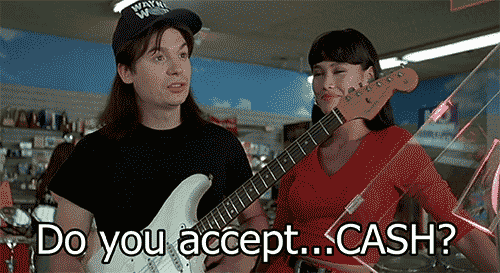Today there have been problems at Tesco Bank. Transactions have been frozen after 40,000 accounts had fraudulent activity detected. This reminds me, yet again, of the dangers of moving to a cashless society.
An individual can always hedge against risk by having multiple bank accounts and payment cards. It’s always a good idea to keep some cash on hand too. However, the usefulness of cash is decreasing and I don’t think we should be transitioning away from it as quickly as we are.
I was recently at a popular London meetup venue and it has a paid bar where you buy your own drinks. No problem with that but they are very particular when it comes to the method of payment.

They don’t take cash.
I think this is the first time I’ve come across this at a bar. It’s normally the other way around. I can understand why they don’t want to handle cash, as there are significant costs associated with doing so, but it’s a worrying trend.
I believe not accepting cash is an unwise idea for three main reasons; resilience, exclusion and privacy.
Resilience
Cash is pretty simple and doesn’t tend to go wrong. However, technology can, and regularly does. There is a dangerous tendency to overcomplicate things which can cause problems. For example, this bar uses iZettle but when I wanted to pay for a drink the PIN pad had run out of charge. No problem right? Plug it in to charge and get another one. Would the spare pad pair with the terminal? No, and by the time they gave up the original had enough power to do one transaction.
This is just a trivial example but banks and payment systems go down and if there is no backup then commerce can grind to a halt. Financial services tend to run on antiquated technology such as old mainframes running COBOL, although there are some new players (such as Monzo). Banks also have a habit of treating IT as a pure cost and outsourcing/off-shoring while shedding their experienced staff. Clearly this affects reliability and uptime.
Exclusion
By only accepting card payments you exclude and discriminate against those who can’t get or don’t want a bank account. This not only includes people with a poor or non-existent credit rating but also many young people. You may think that as this is a bar that they don’t need to worry about young people, but they also sell soft drinks and as this is a place of learning it would be good to encourage an early start.
I remember when I was young it was a challenge to buy anything online and would sometimes have to resort to posting cash. Do we really want to extend this model to the real world too? Imagine how much more people might achieve if they could easily get the resources they need earlier in life.
Privacy
Cash can easily be anonymous but if you pay by card then a profile of your movements and purchases is built up and stored. Not just for fraud prevention but also for marketing purposes. Regardless of why, if the data is available then we know where it will end up. You could get in a lot of bother by innocently buying something in the wrong place at the wrong time.
There are potential solutions such as cryptocurrencies like bitcoin. However, these are not anonymous by default and actually provide a fully traceable history. You would need to buy them in cash or use things like tumblers, but that is a topic for another day.